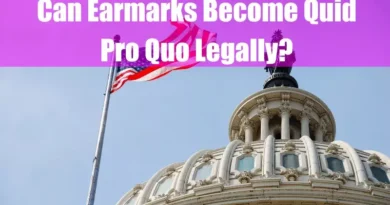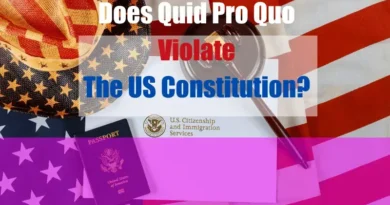Key takeaways from the article “Explaining Government Quid Pro Quo Harassment”:
- Definition: Government quid pro quo harassment involves a government official leveraging their authority to demand something of value from a subordinate or subcontractor in exchange for job benefits or to avoid negative consequences.
- Examples: It can include scenarios like demanding sexual favors for promotions, bribes for contract awards, or better grades in exchange for favors.
- Power Dynamics: Government officials wield significant power over subordinates, citizens, and businesses, making quid pro quo harassment more likely to occur.
- Victims and Perpetrators: Anyone interacting with a government official can be a victim, and perpetrators can range from elected officials to TSA agents or private contractors working on government contracts.
- Impacts on Victims: Victims may suffer psychological, emotional, career, financial, and physical health impacts, alongside damaged relationships and loss of trust in institutions.
- Legal Implications: Quid pro quo harassment is illegal under Title VII and Title IX, and victims have avenues for redress through complaints, civil lawsuits, and criminal charges against perpetrators.
- Victims’ Rights: Victims have rights to be free from discrimination, have a safe workplace, file complaints, seek remedies, and protection from retaliation.
- Prevention Measures: Measures to prevent government quid pro quo harassment include education, clear policies, accountability, fostering a culture of respect, and providing support resources.
- Action for Witnesses: Witnesses should document incidents, report them to appropriate channels, support victims, cooperate with investigations, and advocate for change.
- Resources for Victims: Victims can access resources from organizations like the EEOC, DOE, NSVRC, RAINN, and others for legal assistance, counseling, and advocacy.
These key takeaways encapsulate the crucial points regarding government quid pro quo harassment, emphasizing its definition, examples, impacts, legal implications, prevention measures, and available resources for victims.
I. What is Government Quid Pro Quo Harassment?
Government quid pro quo harassment occurs when a government official uses their position of authority to demand or request something of value from a subordinate or subcontractor in exchange for a job benefit, such as a promotion, raise, or better job assignment, or to avoid a negative job consequence, such as demotion or termination. This can include demanding sexual favors, bribes, or other forms of consideration.
II. Government Quid Pro Quo Harassment Examples

Here are hypothetical examples of government quid pro quo harassment:
- A government official or supervisor demands sexual favors from a subordinate in exchange for a promotion.
- A police officer demands sexual favors from a motorist in exchange for not issuing a ticket.
- A government contractor demands sexual favors from a subcontractor in exchange for a contract award.
- A government teacher demands sexual favors from a student in exchange for a better grade.
- A mayor demands sexual favors from a developer in exchange for approving a zoning permit.
- A cabinet member demands sexual favors from a subordinate in exchange for keeping their job.
- A diplomat demands sexual favors from a local citizen in exchange for issuing them a visa.
- A TSA agent demands sexual favors from a passenger in exchange for letting them pass through security without a pat-down.
These examples depict a disturbing reality: quid pro quo sexual harassment pervades government interactions, from teachers and police officers to judges and elected officials, targeting everyone from motorists and students to contractors and veterans. This abuse of power exploits individuals in exchange for fundamental rights, services, or career advancement.
- Also, read How to Prove Quid Pro Quo Harassment: 13 Powerful Evidences.
- Also, read Quid Pro Quo Harassment vs. Hostile Work Environment Harassment.
III. Understanding the Power Dynamics in Government Settings

Government officials have great power over their subordinates, the citizens they serve, and the businesses and organizations that interact with them. This power differential can create an environment where quid pro quo harassment is more likely to occur.
Here are 10 points to consider when understanding the power dynamics in government settings:
- Government officials can make decisions that can have a significant impact on people’s lives. For example, they can decide whether to grant or deny a permit, approve or deny a benefit, or hire or fire someone.
- Government officials have access to confidential information. This information can be used to pressure or intimidate people or to gain an advantage in negotiations.
- Government officials can use their office’s resources to punish people. For example, they can provide or withhold favors or make or break someone’s career.
- Government officials have a certain level of social status and prestige. This can give them an aura of authority and make it difficult for people to challenge them.
- Government officials are often protected by civil service rules or other regulations that make disciplining or firing them difficult. This can give them a sense of impunity and make them more likely to engage in abusive behavior.
- Subordinates and citizens may be reluctant to report the government for quid pro quo harassment because they fear retaliation. They may fear losing their job, being denied benefits, or being subjected to other negative consequences.
- Government agencies may have a culture that tolerates or encourages quid pro quo harassment. This can be due to a lack of awareness, a lack of training, or a lack of accountability.
- Subcontractors may be particularly vulnerable to government quid pro quo harassment. This is because they are often dependent on government contracts for their livelihood.
- Citizens may be particularly vulnerable to government quid pro quo harassment if they are from marginalized or disadvantaged groups. This is because they may be less likely to speak up against abuse and may be less likely to have their complaints taken seriously.
- Government quid pro quo harassment can be difficult to detect and prevent. It often occurs privately, and victims may fear reporting it.
Understanding the power dynamics in government settings is important to identify and address quid pro quo harassment. Government agencies should take steps to create a culture of respect and accountability, and they should provide training on quid pro quo harassment to all employees. Victims of government quid pro quo harassment should be encouraged to report the incident to the appropriate authorities.
Quid Pro Quo Harassment in the Military: The Best Guide
A. Who can be a victim of Government Quid Pro Quo Harassment?
Anyone interacting with a government official can be a victim of government quid pro quo harassment.
This includes:
- Government employees
- Subcontractors to government contractors
- Students in public schools
- Recipients of government benefits
- Citizens who interact with government agencies
- People from marginalized or disadvantaged groups
- People who are new to the country or who do not speak English fluently
- People with disabilities
It is important to note that anyone can be a victim of government quid pro quo harassment, regardless of race, gender, sexual orientation, age, or socioeconomic status.
- Also, read Is Quid Pro Quo Illegal? 21 Accused Celebrities Examples.
- Also, read Quid Pro Quo History Examples: A Complex Dance of Mutual Exchange.
B. Who can be a perpetrator of Government Quid Pro Quo Harassment?

- Government officials at all levels, including elected officials, appointed officials, and civil servants
- Supervisors and managers
- Law enforcement officers
- Teachers and other school officials
- Social workers
- Judges
- Probation officers and parole officers
- Prison guards and other correctional officers
- Military officers
- Diplomats
- TSA agents
- DMV employees
- Social Security employees
- Medicare employees
- VA employees
- Public housing employees
- Food stamp inspectors
- Tax auditors
- Government contractors
- Subcontractors to government contractors
- Any other person who uses their position of authority in a government setting to demand or request sexual favors or other things of value in exchange for a job benefit or to avoid a negative job consequence
It is important to note that anyone in a position of authority can be a perpetrator of quid pro quo harassment, even if they are not a government employee. For example, a private contractor who is working on a government contract could be a perpetrator of quid pro quo harassment if they demand sexual favors from a subcontractor in exchange for a contract award.
IV. Impact of Government Quid Pro Quo Harassment on Victims
- Psychological distress: Victims of government quid pro quo harassment may experience a range of psychological problems, including anxiety, depression, post-traumatic stress disorder, and low self-esteem.
- Emotional distress: Victims may feel humiliated, degraded, and worthless.
- Career impact: Victims may be demoted, terminated, or have their career advancement opportunities limited.
- Financial impact: Victims may lose income, benefits, and other financial opportunities.
- Fear of retaliation: Victims may be afraid to report the harassment because they fear retaliation from their supervisor or government officials.
- Damage to relationships: Government quid pro quo harassment can damage victims’ relationships with their colleagues, friends, and family members.
- Loss of trust in government: Victims may lose trust in government and other institutions.
- Hesitance to seek help: Victims may hesitate to seek help from others, including law enforcement and mental health professionals.
- Increased risk of substance abuse: Victims may be at increased risk of developing substance abuse problems.
- Physical health problems: Government quid pro quo harassment can lead to physical health problems, such as headaches, stomachaches, and sleep disturbances.
- Social isolation: Victims may disengage from social life.
- Suicidal thoughts: In some cases, government quid pro quo harassment can lead to suicidal thoughts and behaviors.
It is important to note that the impact of government quid pro quo harassment will vary depending on the individual victim. Some victims may experience only a few of these impacts, while others may experience many or all of them.
- Also, read The 13 Legal Implications of Quid Pro Quo Harassment.
- Also, read How to Prevent Quid Pro Quo Harassment: 20 Effective Ways.
V. Legal Implications of Government Quid Pro Quo Harassment

- Government quid pro quo harassment is a form of discrimination and is illegal under Title VII of the Civil Rights Act of 1964 and Title IX of the Education Amendments of 1972.
- Victims of government quid pro quo harassment can file a complaint with the Equal Employment Opportunity Commission (EEOC) or the Department of Education (DOE).
- Victims can also file a civil lawsuit in federal court against the government official who harassed them and their employer.
- Remedies for victims of government quid pro quo harassment can include back pay, lost benefits, front pay, emotional distress damages, and punitive damages in certain cases.
- Employers and educational institutions can be held liable for quid pro quo harassment their employees commit.
- Employers and educational institutions have a legal duty to prevent quid pro quo harassment from occurring.
- Employers and educational institutions can be liable for failing to take reasonable steps to prevent quid pro quo harassment.
- Victims of quid pro quo harassment may be entitled to other forms of relief, such as injunctive relief, which can order an employer or educational institution to stop the harassment or prevent it from happening again.
- Victims of quid pro quo harassment may also be entitled to attorney’s fees and costs if they are successful in their legal claim.
- Government officials who engage in quid pro quo harassment may also face criminal charges.
Victims of government quid pro quo harassment need to know that they are not alone and that they have legal rights. If you have been a victim of government quid pro quo harassment, you should seek legal advice to discuss your options.
A. What are your rights as a victim of Government Quid Pro Quo Harassment?
- The right to be free from discrimination: Title VII of the Civil Rights Act of 1964 prohibits discrimination based on sex, including sexual harassment.
- The right to a safe and hostile-free workplace: Employers are legally obligated to provide their employees with a safe and hostile-free workplace.
- The right to file a complaint with the Equal Employment Opportunity Commission (EEOC): The EEOC is a federal agency that enforces Title VII. Victims can file a complaint with the EEOC online or by mail.
- The right to file a civil lawsuit in federal court: Victims can also file a civil lawsuit against the government official who harassed them and their employer.
- The right to seek remedies for their harm: Victims of government quid pro quo harassment may be entitled to various remedies, including back pay, lost benefits, emotional distress damages, and punitive damages.
- The right to be free from retaliation: Victims have the right to be free from retaliation for reporting government quid pro quo harassment.
- The right to have their complaint investigated: Employers and educational institutions have a legal obligation to investigate complaints of government quid pro quo harassment promptly and thoroughly.
- The right to be informed of the outcome of the investigation: Victims have the right to be informed of the outcome and to have any corrective action taken by the employer or educational institution explained to them.
- The right to file a complaint with the Department of Education: Victims of government quid pro quo harassment in educational settings can file a complaint with the Department of Education’s Office for Civil Rights.
- The right to access legal counsel: Victims of government quid pro quo harassment may be eligible for free or low-cost legal assistance.
- Also, read Sexual Quid Pro Quo Harassment: A Comprehensive Guide.
- Also, read Explaining Non-Sexual Quid Pro Quo Harassment.
VI. Additional Information
A. What can be done to prevent Government Quid Pro Quo Harassment?
- Educate government employees about quid pro quo harassment.
- Establish clear policies and procedures for reporting and investigating quid pro quo harassment complaints.
- Hold employees accountable for quid pro quo harassment.
- Create a culture of respect and dignity in the workplace.
- Provide employees with access to confidential support resources.
- In procurement settings, establish clear and objective criteria for awarding contracts and require contractors to comply with anti-discrimination laws.
- In educational settings, establish clear policies and procedures for reporting and investigating quid pro quo harassment complaints from students.
- In law enforcement, train officers on quid pro quo harassment and establish clear policies and procedures for reporting and investigating citizen complaints.
- Create an independent oversight body to investigate and prosecute quid pro quo harassment cases involving government officials.
- Provide victims of quid pro quo harassment with comprehensive support, including legal assistance, financial assistance, and counseling.
B. What should I do if I witness Government Quid Pro Quo Harassment?

- Document what you saw and heard. This could include writing down a detailed account of the incident, recording the date and time, and identifying other witnesses.
- Report the incident to your supervisor or another trusted person. Suppose you are not comfortable reporting the incident to your supervisor. In that case, you can report it to a human resources department, an equal employment opportunity officer, or an ombudsman.
- Support the victim. If the victim is comfortable talking to you, let them know that you believe them and are there to support them. You can also help them to report the incident and to access resources and support.
- Cooperate with any investigation. Be honest and cooperative if your employer or another government agency investigates the incident. Your testimony may be important in helping to hold the perpetrator accountable.
- Be prepared to speak up. If the perpetrator or their allies try to retaliate against you for reporting the incident, be prepared to speak up again. You may need to file a complaint with the Equal Employment Opportunity Commission (EEOC) or another government agency.
- Educate yourself about the legal rights of victims of quid pro quo harassment. This will help you understand your rights and support the victim effectively.
- Be aware of the potential for retaliation. It is important to be prepared for the possibility that the perpetrator of the harassment or their allies may try to retaliate against you for reporting the incident. Have a plan in place for how you will respond if this happens.
- Take care of yourself. Witnessing quid pro quo harassment can be a stressful and traumatic experience. Seek emotional and physical support from friends, family, or a therapist to care for yourself.
- Consider joining a support group for victims of quid pro quo harassment. This can be a great way to meet people who have been through similar experiences and get support and advice.
- Advocate for change in the workplace and in the legal system. By speaking out against quid pro quo harassment and supporting victims, you can help to make a difference and prevent this type of harassment from happening to others.
Remember that you are not alone. Many people will help you if you have witnessed government quid pro quo harassment.
- Also, read What is Sexual Quid Pro Quo Harassment? An Ultimate Guide.
- Also, read Workplace Quid Pro Quo Harassment: An Ultimate Guide.
- Also, read Educational Quid Pro Quo Harassment: An Ultimate Guide.
C. What resources are available to victims of Government Quid Pro Quo Harassment?
Here are some resources available to victims of government quid pro quo harassment, with their URLs:
- Equal Employment Opportunity Commission (EEOC): https://www.eeoc.gov/
- Department of Education (DOE): https://www2.ed.gov/about/offices/list/ocr/index.html
- National Sexual Violence Resource Center: https://www.nsvrc.org/
- RAINN (Rape, Abuse & Incest National Network): https://www.rainn.org/
- National Whistleblower Center: https://www.whistleblower.org/
- Government Accountability Project: https://www.whistleblower.org/
- Project On Government Oversight: https://www.pogo.org/
- American Civil Liberties Union (ACLU): https://www.aclu.org/
- National Center for Law and Economic Justice: https://nclej.org/
- The National Women’s Law Center: https://www.nwlc.org/
- 13 Powerful Resources for Victims of Quid Pro Quo Harassment
These organizations provide various resources to victims of government quid pro quo harassment, including legal assistance, counseling, and support groups. They also work to advocate for changes in the law and policy to prevent quid pro quo harassment from happening.
In addition to these national organizations, many local and state organizations provide resources to victims of quid pro quo harassment. You can find a list of these organizations by contacting your state’s attorney general’s office or your local bar association.
If you are a victim of government quid pro quo harassment, you are not alone. There are resources available to help you. Please reach out for help if you need it.
VII. Helpful Answers to Further Queries
A. How does government quid pro quo harassment impact individuals from marginalized or disadvantaged groups differently than others?
- Increased risk of retaliation: Individuals from marginalized or disadvantaged groups may be more likely to experience retaliation from their harassers or employers if they report quid pro quo harassment. This is because they may be seen as less credible or deserving of protection.
- Greater difficulty accessing justice: Individuals from marginalized or disadvantaged groups may have greater difficulty accessing justice if they choose to pursue legal action against their harassers or their employers. This is because they may have different resources or access to legal representation than individuals from more privileged groups.
- More severe emotional and psychological consequences: Individuals from marginalized or disadvantaged groups may experience more severe emotional and psychological consequences as a result of quid pro quo harassment. This is because they may already be facing other forms of discrimination and oppression, and quid pro quo harassment can add to their feelings of isolation, powerlessness, and despair.
- Greater difficulty maintaining employment: Individuals from marginalized or disadvantaged groups may have greater difficulty maintaining employment after experiencing quid pro quo harassment. This is because they may be seen as less trustworthy or less competent and more likely to be fired or demoted.
- Reduced opportunities for advancement: Individuals from marginalized or disadvantaged groups may have reduced opportunities for advancement after experiencing quid pro quo harassment. They may be seen as less of a “team player” or less committed to their work.
- Increased financial hardship: Individuals from marginalized or disadvantaged groups may experience increased financial hardship due to quid pro quo harassment. This is because they may be more likely to lose their jobs or be unable to advance in their careers.
- Damage to reputation: Individuals from marginalized or disadvantaged groups may experience damage to their reputation due to quid pro quo harassment. This is because they may be seen as promiscuous or untrustworthy.
- Isolation from social support networks: Individuals from marginalized or disadvantaged groups may experience isolation from their social support networks due to quid pro quo harassment. This is because they may be afraid to talk about their experiences or feel they are not being believed.
- Increased risk of substance abuse and other self-destructive behaviors: Individuals from marginalized or disadvantaged groups may be at increased risk of substance abuse and other self-destructive behaviors as a result of quid pro quo harassment. This is because they may be using these behaviors to cope with the emotional and psychological pain of the experience.
- Increased risk of suicide: Individuals from marginalized or disadvantaged groups may be at increased risk of suicide as a result of quid pro quo harassment. This is because they may feel hopeless and despairing and not see any way out of their situation.
It is important to remember that these are just some of how government quid pro quo harassment can impact individuals from marginalized or disadvantaged groups differently compared to others. The experiences of each individual will vary depending on their unique circumstances.
B. In government quid pro quo harassment involving private contractors on government contracts, what legal recourse do subcontractors have, and how does the legal process differ from cases involving government employees directly?
Subcontractors working on government contracts have legal recourse for government quid pro quo harassment in the following ways:
- File a complaint with the contracting agency: Subcontractors can file a complaint with the agency responsible for the government contract. The contracting agency will investigate the complaint and take appropriate action, including terminating the contract with the prime contractor or taking other disciplinary action against the prime contractor or its employees.
- File a complaint with the Equal Employment Opportunity Commission (EEOC): Subcontractors can also file a complaint with the EEOC, the federal agency responsible for enforcing anti-discrimination laws. The EEOC will investigate the complaint and may file a lawsuit against the prime contractor on the subcontractor’s behalf.
- File a lawsuit in federal court: Subcontractors can also file a lawsuit against the prime contractor for government quid pro quo harassment.
a) Differences between cases involving government employees directly:
- Government employees are covered by Title VII of the Civil Rights Act of 1964, which prohibits discrimination based on race, color, religion, sex, and national origin. Title VII does not directly cover subcontractors on government contracts. However, they may still claim under Title VII if they can show that the government motivated the prime contractor’s actions.
- Government employees can also file complaints with the Merit Systems Protection Board (MSPB), a federal agency that protects their rights. Subcontractors on government contracts do not have the right to file a complaint with the MSPB.









